30-Minute 5k Race: 4-Week Training Plan to Beat the Distance
Author:
Unlock your full potential by engaging with our experts and community! Have questions about your fitness journey or looking for expert advice on weightlifting techniques? Don’t hesitate — leave a comment below and Oleksandr Zagrebelnyi will provide a personalized answer and insights to help you reach your goals.
Torokhtiy is reader-supported. Some links are affiliate links, and we may earn a commission at no extra cost to you. See our disclosure page for details.
Are you aiming to complete a 5k run in 30 minutes? Look no further! This guide will provide you with valuable insights and proven methods to help you achieve your goal. Discover how to improve your pace and endurance for a successful 30-minute 5k race.
Is 5k in under 30 minutes possible? – Definitely! With proper training, consistent effort, and the right technique, you can improve your speed and endurance to achieve your goal. Follow a structured training plan and focus on pacing yourself to make steady progress toward running a 30-minute 5k.
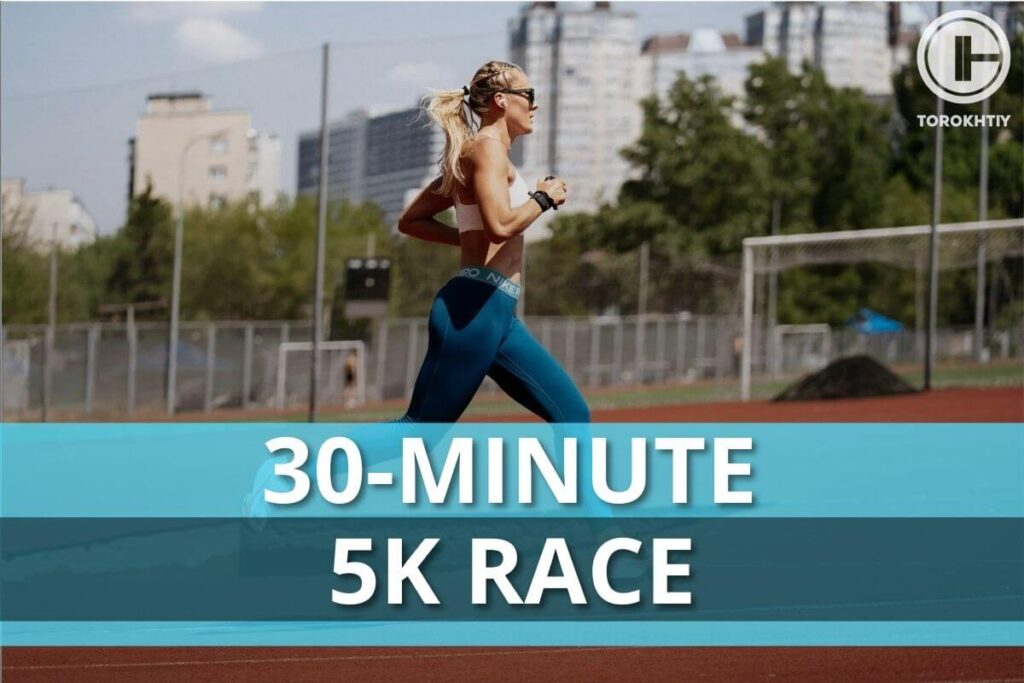
General Information About Running 5k Race
Running a 5K race involves covering a distance of 5 kilometers, which is equivalent to approximately 3.1 miles. The 5K distance is often seen as a manageable challenge for both beginners and experienced runners, making it a great choice for those looking to participate in their first race or improve their speed and endurance.
For beginners, completing a 5K race provides an opportunity to set a fitness goal, build endurance, and experience the sense of accomplishment that comes with crossing the finish line. Many running programs and training plans are designed specifically to prepare individuals for their first 5K race, gradually building up their running endurance over time.
Experienced runners often aim to complete 5k in 30 minutes as a metric of progress in their running fitness. It allows them to push their limits and strive for faster times. Additionally, the relatively shorter distance of a 5K race enables runners to recover more quickly than with longer races, such as half-marathons or marathons.
The perceived difficulty of a 5K race can vary depending on an individual’s fitness level, running experience, and personal goals. For experienced runners who have been training regularly, a 5K race may be relatively easy. However, for beginners or individuals who are new to running, the 5K distance can present a significant challenge.
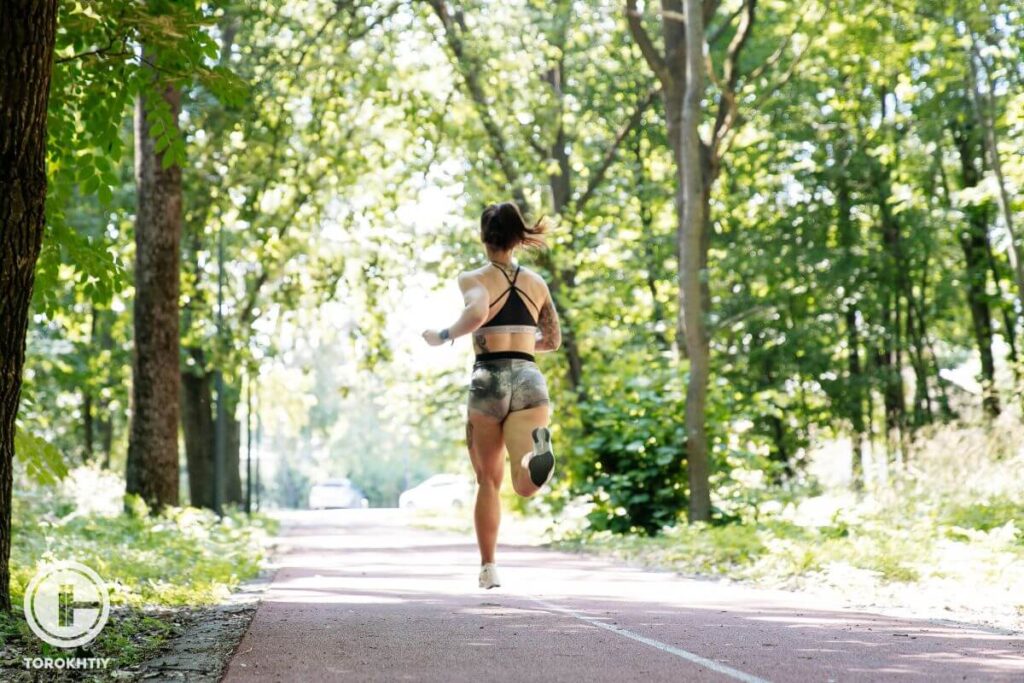
Average Time to Run 5k: Top 3 Factors that Affect the Time
On average, recreational runners can finish running a 5k in 30 minutes while elite runners can complete a 5k in under 15 minutes. The average time to run a 5k race can vary depending on various factors, such as age, gender, and pace. Let’s delve into these aspects in more detail.
1. Age
Age affects the average time it takes to run a 5k. Younger people tend to have faster times due to their energy and fitness levels. However, older individuals who run regularly can still achieve good results. Here’s a breakdown by age group:
• Teenagers
Teens usually finish a 5k race in about 20 to 25 minutes. Some athletic teens may have even faster times.
• Adults
This age group displays a wide range of running abilities. On average, adults complete a 5k in 25 to 35 minutes.
• Middle-Aged and Older Adults (50+)
While average times may increase slightly, individuals in this age group who maintain a regular exercise routine can generally finish a 5k race in 30 to 40 minutes or less.
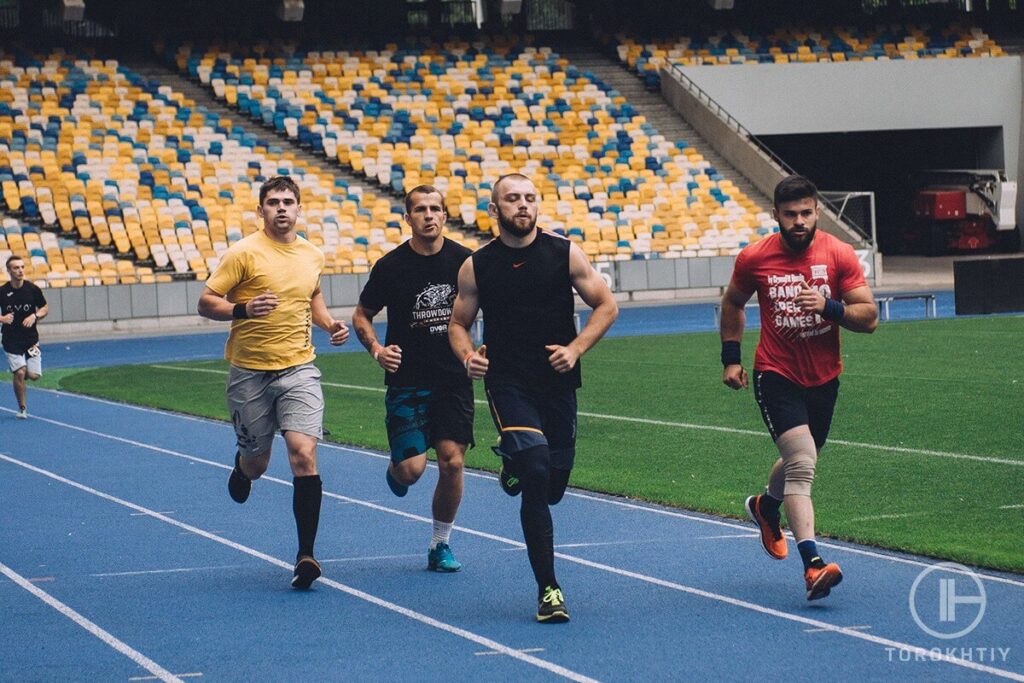
2. Gender
When comparing average times between genders, it’s important to note that the gap is gradually closing as more women participate in running events and showcase their athletic prowess. Here are the current averages:
• Men
Men typically complete a 5k race within 20 to 30 minutes.
• Women
The average time for women to finish a 5k race is generally between 25 to 35 minutes.
3. Pace
Pace refers to the speed at which a runner completes each kilometer of the race. It is measured in minutes per kilometer (min/km) or minutes per mile (min/mi). A runner’s pace directly impacts their overall finishing time. Let’s take a look at what pace is a 30-minute 5k.
• Beginners
Beginners may start at a slower pace, ranging from 6 to 8 minutes per kilometer (10 to 13 minutes per mile). This pace allows them to complete the race within 35 to 40 minutes or
more.
• Recreational Runners
Recreational runners typically maintain a 30-minute 5k pace of 5 to 6 minutes per kilometer (8 to 10 minutes per mile), enabling them to finish a 5k race in approximately 25 to 30 minutes.
• Elite Runners
Elite runners maintain a pace of around 3 to 4 minutes per kilometer (5 to 7 minutes per mile). This allows them to complete a 5k race in under 15-20 minutes.
Is a 30-Minute 5k Good?
Completing a 5k in 30 minutes is a commendable achievement, as it requires a good level of fitness and running proficiency. However, it is important to note that the ability to run a 5k in under 30 minutes depends on several factors, including individual capabilities and training.
For most recreational runners, achieving a sub-30-minute 5k time can be challenging, especially if they are relatively new to running.
Running at an average pace of 6 minutes per kilometer, which is required to complete a 5k in 30 minutes, demands a moderate to high level of fitness and a solid running base. It requires consistent training, discipline, and perseverance to improve both speed and endurance.
To achieve a 30-minute 5k, it’s helpful to establish a structured training routine. This typically includes a combination of aerobic exercises, such as running, along with strength training and cross-training activities. Additionally, factors such as age, gender, fitness level, and previous running experience can influence one’s ability to attain a 30-minute 5k.
It’s worth mentioning that personal goals should always prioritize personal progress and enjoyment of the sport. Running is a highly individualized activity, and comparing oneself to others can hinder motivation or lead to unnecessary pressure.
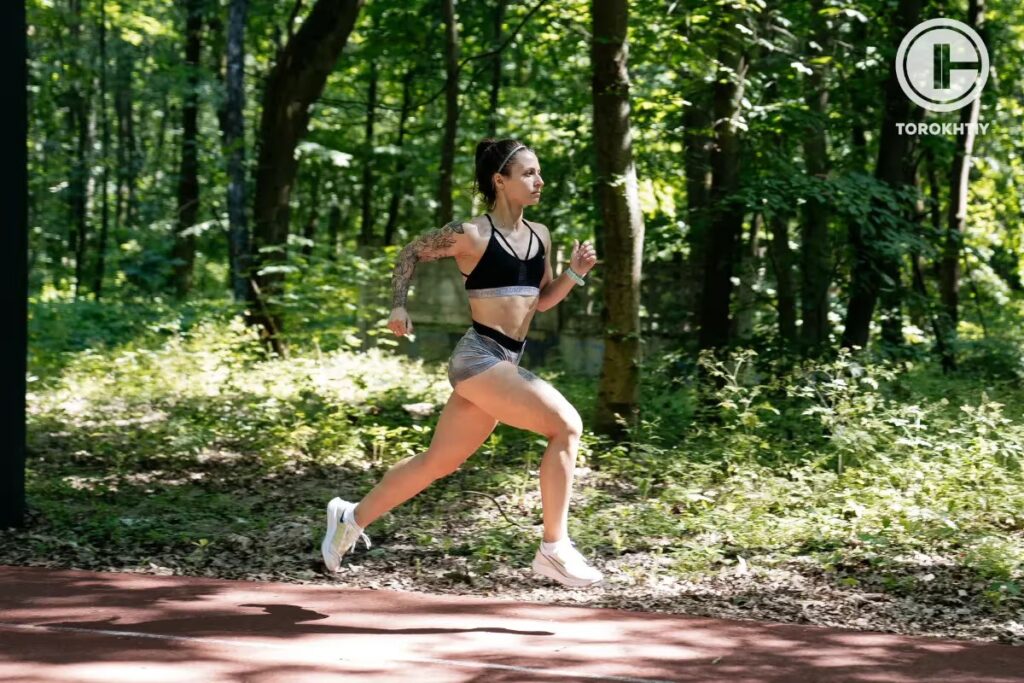
3 Tips How to Prepare to Complete a 5K Run in 30 Minutes
Preparing for a 5K run in a short period of time requires focus, dedication, and efficient training. Here are some top tips on how to run faster in less time:
1. Set Realistic Goals
So, how to run 5k in 30 minutes? Before starting your training, it’s essential to set realistic goals based on your current fitness level and the time you have available. Assess your current running ability and determine what pace you’d like to achieve for the 5K run. Setting attainable goals will help you stay motivated and track your progress effectively.
2. Establish a Training Schedule
It’s crucial to establish a training schedule that maximizes your training efforts. Aim for at least three to four training sessions per week, with each session focusing on different aspects of your running performance.
Pro Tip
Remember that there is no one “best” 30-minute 5K training plan. The best plan for you is one that aligns with your lifestyle and schedule.
Running Coach Nike Run Club Kyiv
3. Incorporate Interval Training
Interval training is a highly effective method to improve your running speed. Alternate between high-intensity intervals and periods of active recovery. For example, you can sprint for 30 seconds and then jog or walk for one minute to recover. Gradually increase the duration and intensity of your intervals over time.
Sub-30-Minute 5k Training Plan
To achieve a sub-30-minute 5K race time, you will need a well-structured training plan that combines speed workouts, endurance runs, and recovery days. Here’s a detailed, one-month training plan divided into weekly segments to help you reach your goal.
Week 1
During the first week of the training plan, the focus is on building a foundation and improving endurance. It’s important to start with a gradual increase in intensity and mileage to prevent injury.
| Day | Workout |
|---|---|
| Monday | Rest day. |
| Tuesday | Go for a 30-minute, easy-paced run to warm up your muscles. |
| Wednesday | Run uphill for 60 seconds at a challenging pace. Repeat 6-8 times. |
| Thursday | Run at a comfortably hard pace for 20 minutes. |
| Friday | Rest or cross-train. |
| Saturday | Aim for a distance that is 60-75% of your target 5k race distance, running at an easy pace. |
| Sunday | Take a complete rest day. |
Week 2
In the second week, the focus shifts towards building speed and improving lactate threshold, which is crucial for running at a faster pace without too much fatigue.
| Day | Workout |
|---|---|
| Monday | Rest day to recover from the previous week’s training. |
| Tuesday | Run 400 meters at a fast pace, and recover with a slow 200-meter jog. Repeat 8-10 times. |
| Wednesday | Go for a 30- to 40-minute, easy-paced run to maintain aerobic fitness and aid recovery. |
| Thursday | Run at a comfortably hard pace for 15-20 minutes. |
| Friday | Rest or cross-train. |
| Saturday | Run at an easy pace for a distance of 75-85% of your target 5k race distance. |
| Sunday | Take a complete rest day. |
Week 3
During the third week, the focus is on increasing intensity and challenging your body to adapt to faster paces. The workouts will involve longer intervals and a more demanding pace.
| Day | Workout |
|---|---|
| Monday | Rest day to allow your body to recover. |
| Tuesday | Run 800 meters at a fast pace and recover with a slow 400-meter jog. Repeat 6-8 times. |
| Wednesday | Go for a 30- to 40-minute, easy-paced run to aid recovery and maintain fitness. |
| Thursday | Run at a comfortably hard pace for 20-25 minutes. |
| Friday | Rest or cross-train. |
| Saturday | Run at an easy pace for a distance of 85-90% of your target 5k race. |
| Sunday | Take a complete rest day. |
Week 4
In the final week before the race, the focus is on maintaining fitness and increasing your speed. The training volume decreases to allow your body to recover and be fresh for the
race.
| Day | Workout |
|---|---|
| Monday | Rest day to recover and prepare for the final week of training. |
| Tuesday | Run 400 meters at a fast pace and recover with a slow 200-meter jog. Repeat 6-8 times. |
| Wednesday | Go for a 30-minute, easy-paced run to maintain aerobic fitness and aid recovery. |
| Thursday | Run at a comfortably hard pace for 15-20 minutes. |
| Friday | Rest or cross-train. |
| Saturday | Go for a short, easy-paced 20-30 minutes run to keep your legs loose and prepare mentally. |
| Sunday | Participate in your goal 5k race and give it your best effort! |
The above training plan will increase your effort gradually to help prevent burnout. You’ll challenge yourself, but never so much that it feels overwhelming. It allows for plenty of rest and recovery so that your body stays strong.
Hoka Bondi 8
- Material: Breathable and supportive mesh upper
- Sole Material: Full-length EVA midsole for maximum cushioning
- Outsole (tread feature): Durable rubber outsole with a unique lug pattern
- Drop: 4mm
- Season: Suitable for all seasons
- Special Features: Exceptional cushioning and comfort
- Size: Available in various sizes
- Type: Maximum cushioning running shoe
If you want excellent running or walking shoes or just footwear you’ll be comfortable in, you can’t go wrong with the Hoka Bondi 8.
It’s been upgraded and now they have lighter, softer materials and a new extended heel design. The heel design gives a super soft, balanced feeling from th emoment your heel hits the ground to when you push off with your toes.
As far as the weight goes, it’s around 10.80 ounces, and the heel drop is 4 mm. They’re not too heavy and the lower drop is a good balance between cushioning and feeling connected to the ground.
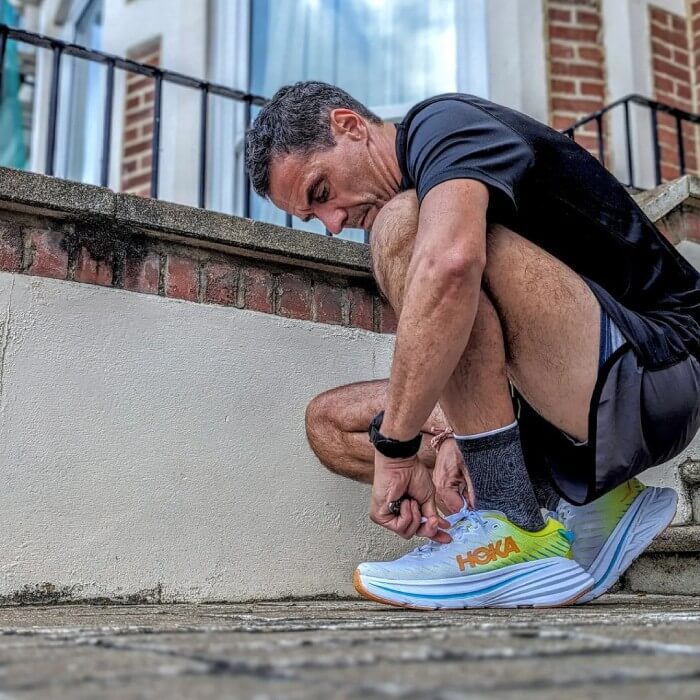
The Bondi 8 is focused on cushioning and keeps things simple. There’s a good amount of support without any extra stuff that you don’t really need and that would only jack up the price. Take the rear crash pad, for example – it makes for a soft, smooth ride, which is perfect if you like to run outdoors.
The upper part is made of engineered mesh, which is breathable and keeps your feet cool and dry. The tongue and collar have memory foam and mold to your foot shape. All of these features make the fit snug but flexible, which is exactly what you would want.
The Bondi 8 is eco-friendly because it uses recyclable materials in parts like the mesh and the sockliner. Plus, the shoes are completely vegan, which (if that’s important to you) is nice!
FAQ
How fast of a pace is required to run a 5k in 30 minutes?
To run a 5k in 30 minutes, you need to maintain a steady pace of 6 minutes per kilometer throughout the race.
How many calories are burned running 5km in 30 minutes?
Running a 5k in 30 minutes can help you burn approximately 400 to 500 calories, depending on factors like your weight and running intensity.
Conclusion
In conclusion, mastering the 30-minute 5K is an achievable goal for runners looking to improve their speed and endurance. By following a well-designed training plan, incorporating interval and tempo runs, and focusing on proper pacing, runners can make significant progress. With commitment and perseverance, it is possible to cross the finish line of a 5K race in 30 minutes.
Also read:
References:
- Leisure-Time Running Reduces All-Cause and Cardiovascular Mortality Risk // ScienceDirect: https://www.sciencedirect.com/science/article/pii/S0735109714027466
- Effects of resistance training on performance in previously trained endurance runners: A systematic review // Taylor & Francis Online: https://www.tandfonline.com/doi/abs/10.1080/02640414.2017.1326618
- Get running with Couch to 5K // NHS: https://www.nhs.uk/live-well/exercise/running-and-aerobic-exercises/get-running-with-couch-to-5k/
- Resistance Training is Medicine Effects of Strength Training on Health // Lippincott Browse Journals: https://journals.lww.com/acsm-csmr/Fulltext/2012/07000/Resistance_Training_is_Medicine__Effects_of.13.aspx
- Six Sessions of Sprint Interval Training Improves Running Performance in Trained Athletes // The Journal of Strength & Conditioning Research: https://journals.lww.com/nsca-jscr/Fulltext/2018/03000/Six_Sessions_of_Sprint_Interval_Training_Improves.5.aspx
- Photos are made by Torokhtiy Media Team
Why Trust Us?
With over 20 years in Olympic weightlifting, strength training, nutrition coaching, and general fitness our team does its best to provide the audience with ultimate support and meet the needs and requirements of advanced athletes and professional lifters, as well as people who strive to open new opportunities and develop their physical capabilities with us.
By trusting the recommendations of our certified experts in coaching, nutrition, and sports training programming, as well as scientific consultants, and physiotherapists, we provide you with thorough, well-considered, and scientifically proven content. All the information given in the articles concerning workout programming, separate exercises, and athletic performance, in general, is based on verified data.
The product testing process is described in more detail here.
Oleksandr is a running coach and member of the Nike Run Club coaching team for 8 years. A participant in national and international competitions at distances from one kilometer to the ultra trail. Owner of mountain trail running camps. Nowadays Oleksandr is responsible for creating running training programs for athletes of various levels, coaching personally offline and online, conducts trail running camps in the mountains, participates in competitions.



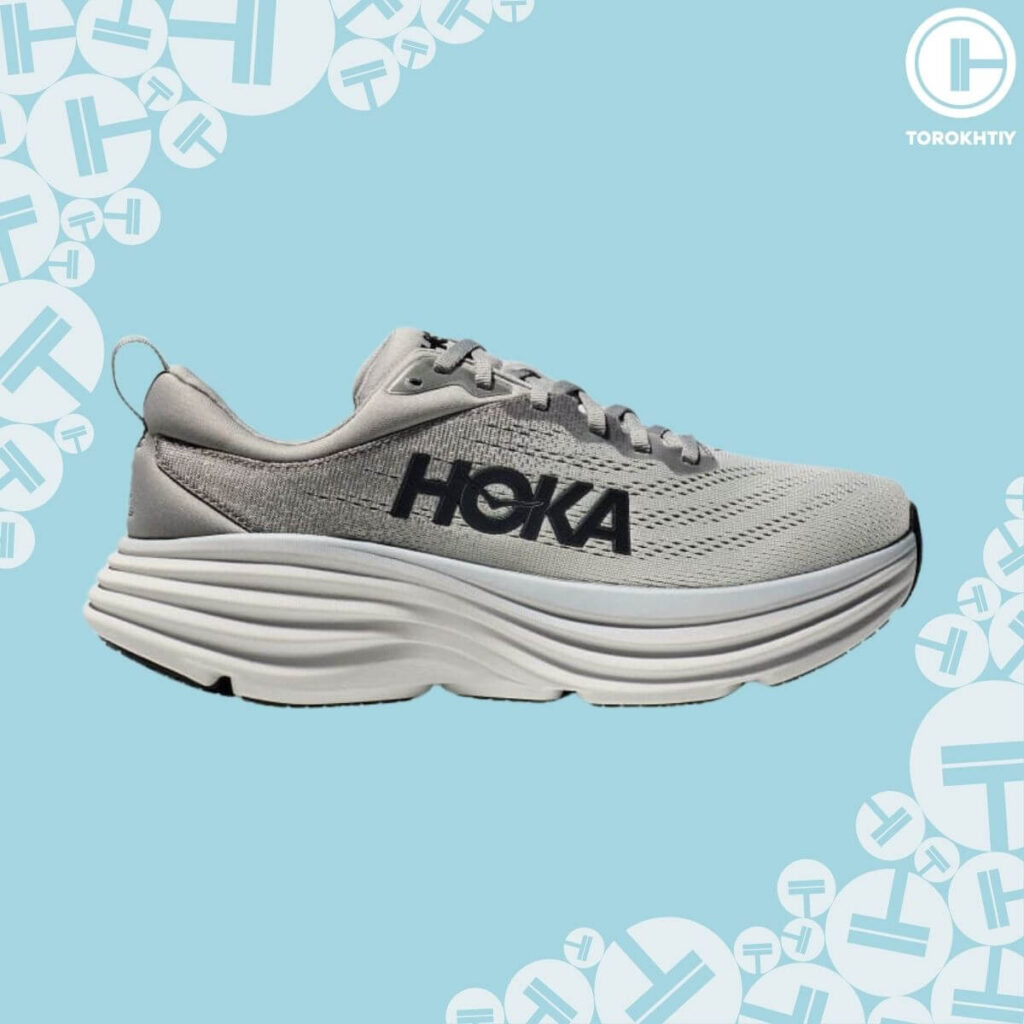
Still have questions after reading our article? Unlock your full potential by engaging with our experts and community! Don’t hesitate — leave a comment below and Oleksandr Zagrebelnyi will provide a personalized answer and insights to help you reach your goals.